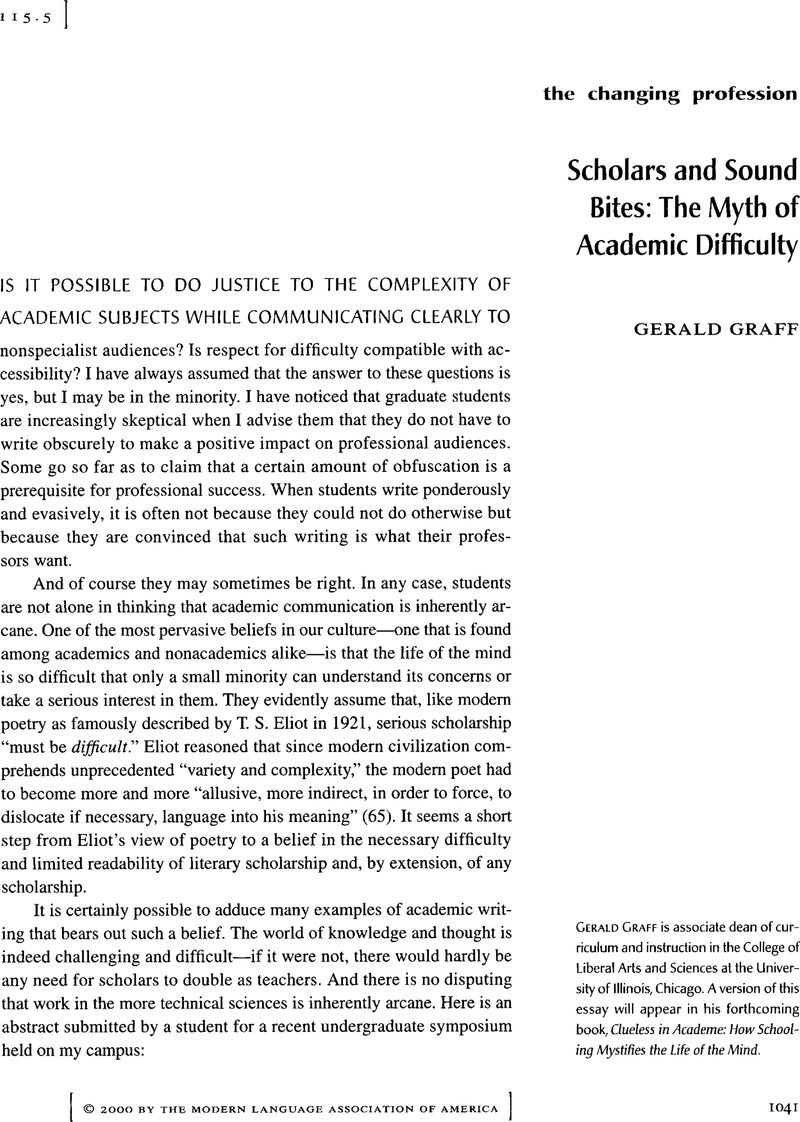Crossref Citations
This article has been cited by the following publications. This list is generated based on data provided by Crossref.
Benton, Steve
2003.
Conflicts over Conflicts.
Pedagogy,
Vol. 3,
Issue. 2,
p.
245.
Tompkins, Jane
2003.
Jerry's Blind Spot.
Pedagogy,
Vol. 3,
Issue. 2,
p.
250.
Graff, Gerald
2003.
Conflict Clarifies: A Response.
Pedagogy,
Vol. 3,
Issue. 2,
p.
266.
Stroupe, Craig
2003.
Technologizing the Conflicts: Graff and the Web.
Pedagogy,
Vol. 3,
Issue. 2,
p.
263.
Wallen, Jeffrey
2003.
We Really Do Not Know How to Disagree with Each Other.
Pedagogy,
Vol. 3,
Issue. 2,
p.
253.
Shumway, David R.
2003.
Graff and the Left.
Pedagogy,
Vol. 3,
Issue. 2,
p.
259.
Valenza, Robin
2003.
Gerald Graff at the Museum of Natural History.
Pedagogy,
Vol. 3,
Issue. 2,
p.
256.
Wolf, Karl H.
2010.
Special Book Reviews.
International Journal of General Systems,
Vol. 39,
Issue. 6,
p.
659.
Bruce, Susan
2013.
The Hector Hypothesis: Disciplines, Difficulty, and Democracy.
Journal of the Knowledge Economy,
Vol. 4,
Issue. 1,
p.
6.
Korotkina, Irina
2017.
(Analysis of Courses of Academic Writing in Foreign Universities and Recommendations for the Russian Federation).
SSRN Electronic Journal ,
Korotkina, I. B.
2017.
Academic Literacy and Methods of Global Scientific Communication.
Science Editor and Publisher,
Vol. 2,
Issue. 1,
p.
8.
Ghosh, Aditya
2018.
Sustainability Conflicts in Coastal India.
p.
3.
Sword, Helen
Blumenstein, Marion
Kwan, Alistair
Shen, Louisa
and
Trofimova, Evija
2018.
Seven Ways of Looking at a Data Set.
Qualitative Inquiry,
Vol. 24,
Issue. 7,
p.
499.
Wolfenden, Helen
Sercombe, Howard
and
Tucker, Paul
2019.
Making Practice Publishable: What Practice Academics Need to Do to Get Their Work Published, and What that Tells Us about the Theory-practice Gap.
Social Epistemology,
Vol. 33,
Issue. 6,
p.
555.
Ghosh, Aditya
2020.
Deconstructing a 2-year long transdisciplinary sustainability project in Northern universities: is rhetorical nobility obscuring procedural and political discords?.
Sustainability Science,
Vol. 15,
Issue. 4,
p.
1111.
Jeong, Seongkyoon
Rogers, Zachary S.
and
Washispack, Seth
2023.
Writing to advance knowledge: The impact of readability on knowledge diffusion in OSCM.
Decision Sciences,
Vol. 54,
Issue. 3,
p.
297.
Engelmeier, Hanna
2023.
Schwierige Texte in Kritik und Vermittlung.
Journal of Literary Theory,
Vol. 17,
Issue. 1,
p.
62.





